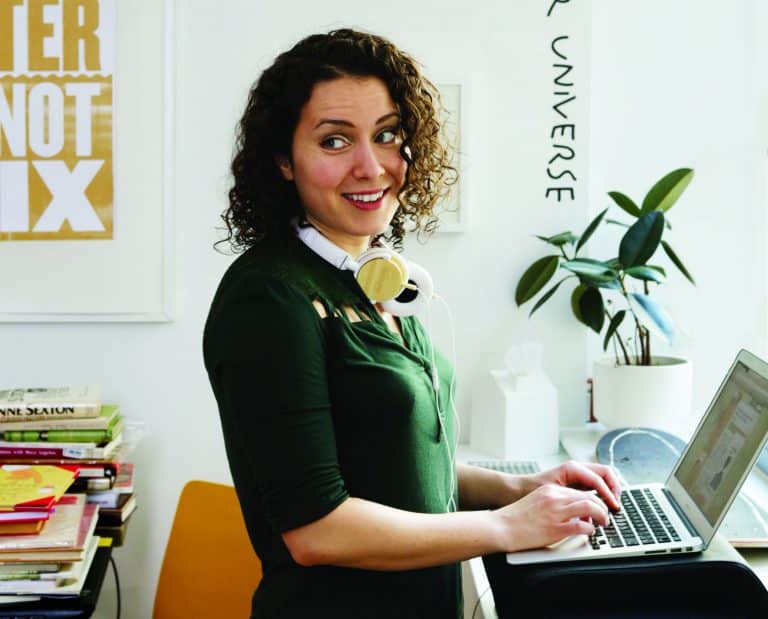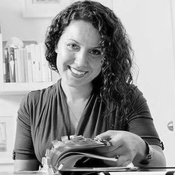Maria Popova
Mapping Meaning in a Digital Age
“Critical thinking without hope is cynicism. But hope without critical thinking is naïveté. I try to live in this space between the two.” The creator and editor of Brain Pickings on the pratfalls and promise of knowledge-sharing in the digital age.

Image by Anna Wolf, © All Rights Reserved.
Guest

Maria Popova is the creator and presence behind Brain Pickings, which is included in the Library of Congress’s permanent digital archive of culturally valuable materials. She is the author of Figuring and hosts “The Universe in Verse” — an annual celebration of science through poetry — at the interdisciplinary cultural institute Pioneer Works in Brooklyn.
Transcript
Ms. Krista Tippett, Host: This generation’s wisdom is being spun in concert with technology. The internet is our version of splitting the atom. It holds immense powers, both perilous and promising, as it up-ends the meaning of ancient, elemental human things like making and leading and belonging and learning. We know ourselves not only to be connecting to others beyond kin and tribe. We have the means and the freedom to create our own tribes bound by passion and service, quite apart from bloodline or geography. So is the story of Maria Popova’s internet phenomenon, Brain Pickings.
Ms. Maria Popova: I spend most of my days buried in book piles and letters and diaries and old philosophy books and whatnot. There’s this term in kind of new-agey circles, “spiritual re-parenting,” which is a bit too new-agey even for my taste. And I can be quite the hippie sometimes. But there’s an aspect of it that I like. It’s led me to think about what I do as a kind of two-way generational re-parenting — on the one hand caring for these bygone thinkers, while at the same time imbuing the present generation with their hand-me-down wisdom and their most enduring ideas.
Ms. Tippett: I think Maria’s central-European background gives her an audacious, somewhat un-American faith in the power of ideas. And somehow she manages to use technological tools in service of old-fashioned wisdom. When I speak with Maria at thirty, she’s already been at this for a decade. Brain Pickings is a labor of love with a vast following now, and it points at technology’s redemptive potentials. She, like Brené Brown, has stumbled on a robust vocabulary of hope while pursuing seemingly unrelated questions.
I think the magnetism of your work, the appeal of it for people, is that it’s aspirational. Which is a contrast to “disruptive.” We have all these assumptions we walk around with and lay over new generations, that there’s no place for depth, that you can only take things in bite-sized pieces. And yet, you present this discovery to people that we want our brains to be stretched. I feel that there’s a real quality in you as a human being, which comes through in your work, of intellectual confidence and generosity. Is there a philosophy in you about that?
Ms. Popova: Well, there are certain core beliefs, I guess. I think a lot about the relationship between cynicism and hope. Critical thinking without hope is cynicism, but hope without critical thinking is naïveté. I try to live in this place between the two, to try to build a life there. Because finding fault and feeling hopeless about improving our situation produces resignation, of which cynicism is a symptom, a sort of futile self-protection mechanism. But on the other hand, believing blindly that everything will work out just fine also produces a kind of resignation, because we have no motive to apply ourselves toward making things better. I think in order to survive, both as individuals and as a civilization, but especially in order to thrive, we need to bridge critical thinking with hope.
Ms. Tippett: You often say that one of the things you’re looking for in content for Brain Pickings is something that contains “both timeliness and timelessness.”
Ms. Popova: So much of culture deals with what is urgent right now and not what is important in the grand scheme of things. And there is this sort of time bias or presentism bias that happens.
Ms. Tippett: Presentism. I like that.
Ms. Popova: Which is in part because of the way that the Internet is structured. So when you think of anything from a Twitter feed or a Facebook feed to a news website, the most recent floats to the top, always. And it’s always in reverse chronology. And I think that’s conditioning us to believe, rather falsely, that the most recent is the most important, and that the older matters less or just exists less, to a point where we really have come to believe that things that are not on Google or on the news never happened, never existed, or don’t matter. The internet — its beauty is that it’s a self-perfecting organism, right? But as long as it’s an ad-supported medium, the motive will be to perfect commercial interest, to perfect the art of the listicle, the endless slideshow, the infinitely paginated article, and not to perfect the human spirit of the reader or the writer.
Ms. Tippett: You’ve quoted Anne Lamott — she’s actually talking about something Emily dinkinson said — that “hope inspires the good to reveal itself.” When you say that the internet is a self-perfecting organism — do you have hope and confidence in the internet, in our technology, as a place where the human spirit can be cultivated and deepened? That’s not language people often use when they’re speaking of our lives with technology.
Ms. Popova: Well, the thing to keep in mind is that this is such a young medium, you know? We have not even had a full generation live and die with it. And I think, like any territory to which we bring the pioneer spirit, it is bound to have both the good and the evil. And we’re not going to know how it turns out until much, much, much later. But in the meantime, the decisions we make, the microscopic decisions that we make daily, shape it.
I am not so foolish as to make predictions, but I can tell you my hope, which is that I do think that people will come to rebel against the things that just don’t work for us spiritually, intellectually, creatively. And we’re seeing this to some degree. I think the younger generations — and I don’t mean this by age, but I mean people who are more recently coming onto the scene of the internet — are more willing to, for example, pay for ad-free versions of publications, or to limit what they engage with, and recognize that, actually, it takes time and thought and effort and resources to produce a publication that is nourishing as opposed to a cat listicle, and to make decisions according to how something makes you feel in the end, and what kind of contribution it’s making to the common record.
I was listening to an interview with Jimmy Wales, the founder of Wikipedia, and he said that people contribute to Wikipedia for free because they want to do something useful with their time. I agree. I think people hunger to do something useful with their time in our age of uselessness, time uselessly spent. But also to do something ennobling with their time — and this can’t quite be quantified. There’s no utilitarian value to it the way that there is with usefulness. I deeply believe that people want to be good, that, more than that, we want to be better, to grow, to ennoble our souls. And I have hope for this medium with that lens.
We never see the world exactly as it is because we are how the world is. I think it was William James who said, “My experience is what I agree to attend to, and only those things which I notice shape my mind.” And so in choosing how we are in the world, we shape our experience of that world, our contribution to it. We shape our world, our inner world, our outer world, which is really the only one we’ll ever know. And to me, that’s the substance of the spiritual journey. It’s not an exasperating idea but an infinitely emboldening one, and it’s taken me many years to come to that without resistance.




